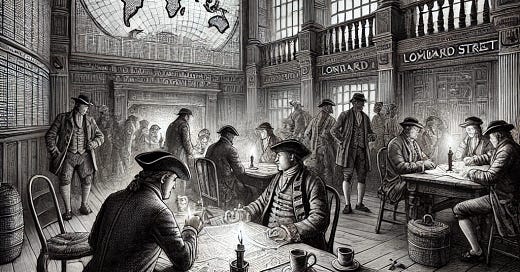From Coffee to Capital: How a Coffeehouse Shaped the Maritime Trade and Modern Insurance
Lloyd's List: The Bloomberg Terminal of Georgian London
On a foggy London morning in 1696, a merchant hurries through the crowded streets toward Lloyd's Coffee House at 16 Lombard Street. Inside, amid the aroma of coffee and tobacco, he finds what he's looking for: the latest shipping news posted on the wall. This humble beginning would evolve into Lloyd's List, the world's oldest continuously published business newspaper. Two centuries before Bloomberg terminals would revolutionize financial data, Edward Lloyd had stumbled upon a truth about markets: information itself could be the most valuable commodity of all.
From Coffee Server to Information Mogul
Edward Lloyd's rise began behind someone else's counter. As a young man, he served coffee at Miles's Coffee House in Tower Street, watching carefully how shipping merchants conducted their business. When he opened his own establishment in 1688, he didn't just copy the coffee house model – he improved it. While Miles's attracted some shipping traffic, Lloyd made maritime intelligence his focus, meticulously collecting and verifying every scrap of shipping news he could find.
The move to 16 Lombard Street in 1691 proved decisive. Located in the heart of London's maritime business district, the coffee house became a hub where merchants, ship captains, and insurers gathered. Lloyd's keen eye for valuable information transformed him from a simple coffee server into the nexus of London's maritime trade network.
From Wall to Print
Lloyd began his publishing venture with Lloyd's News in 1696, though this first attempt lasted only 76 issues. The more successful Lloyd's List launched in 1734, by which time the coffee house was under new ownership (Edward Lloyd having died in 1713, ownership had transferred to Thomas Jemson through a series of marriages and deaths). Published weekly, the List provided shipping arrivals and departures, along with data about vessels, cargo, and maritime conditions. In an age of uncertain communication, Lloyd's List became the closest thing to ground truth in maritime trade.
The First Information Network
What began as notices on a wall evolved into one of history's first systematic business intelligence networks. The coffee house became a hub where ship captains would bring news from distant ports, merchants would share cargo manifests, and insurers would report losses. This network grew more sophisticated after Lloyd's death, with regular correspondents established in major ports and a system of signal stations along the British coast to report ship movements.
The Rise of Marine Insurance
Among the early regulars at Lloyd's was John Julius Angerstein, a Russian-born merchant who would become known as the "father of Lloyd's." Angerstein recognized that reliable shipping intelligence was essential for accurately pricing maritime risk. Under his influence, the informal insurance arrangements made over coffee and tobacco evolved into more standardized practices. Under Angerstein's leadership, the Society of Lloyd's was established in 1771, becoming the foundation for Lloyd's of London
The Lloyd's Register of Ships, first published in 1764, provided standardized information about vessel conditions and classifications, creating a common language for assessing maritime risk.
News That Moved Markets
The List's reputation was built on being first with news that mattered. During the American War of Independence, it provided crucial intelligence about privateer activities, helping merchants and insurers navigate increasingly dangerous waters. The publication's network of correspondents meant it often broke news of significant maritime events before official channels.
One of the List's most dramatic moments came in reporting the Battle of Trafalgar. Through its network of signal stations along the coast, Lloyd's List provided some of the first details of both the victory and Nelson's death. The publication's matter-of-fact style belied the magnitude of the news: "Off Cadiz, Oct. 21, 1805. This day in a great battle off here, the English fleet commanded by Lord Nelson, has gained a complete victory over the combined fleets of France and Spain..."
War and Business
During the Napoleonic Wars, Lloyd's List became essential reading for anyone involved in maritime trade. Its pages tracked not just merchant vessels but also French privateers and naval engagements. The publication developed a complex network of neutral correspondents in European ports, providing intelligence that helped British merchants navigate the Continental System while helping insurers price the increasing risks of maritime trade.
The List's wartime role highlighted a crucial aspect of its success: in times of uncertainty, reliable information becomes even more valuable. Merchants would gather at Lloyd's Coffee House to read the latest news, discuss its implications, and adjust their strategies accordingly. The publication's ability to maintain reliable intelligence networks even during wartime set it apart from competitors.
The Value of Verification
Lloyd's success came from understanding something fundamental about information markets: reliability commands a premium. While other coffee houses posted shipping news, Lloyd's took the time to verify reports and standardize their presentation. The List's reputation for accuracy made it indispensable to maritime trade, with merchants and insurers willing to pay for trusted information.
The Modern Echo
Today's financial data providers follow Lloyd's template more closely than they might realize. Bloomberg terminals, like Lloyd's List before them, succeed by becoming the trusted central source in their market. Modern newsletter writers building on platforms like Substack are rediscovering the power of regular, reliable information delivered to a dedicated audience.
Coffee House to Terminal
What began in a coffee house evolved into something far more significant: a trusted platform for market information. When Lloyd's List finally ended its print run in 2013, it had been continuously published for 279 years. But Lloyd's core insight - that reliable information is the lifeblood of markets - remains as true in the age of algorithmic trading as it was in the age of sail.
Stay tuned.




